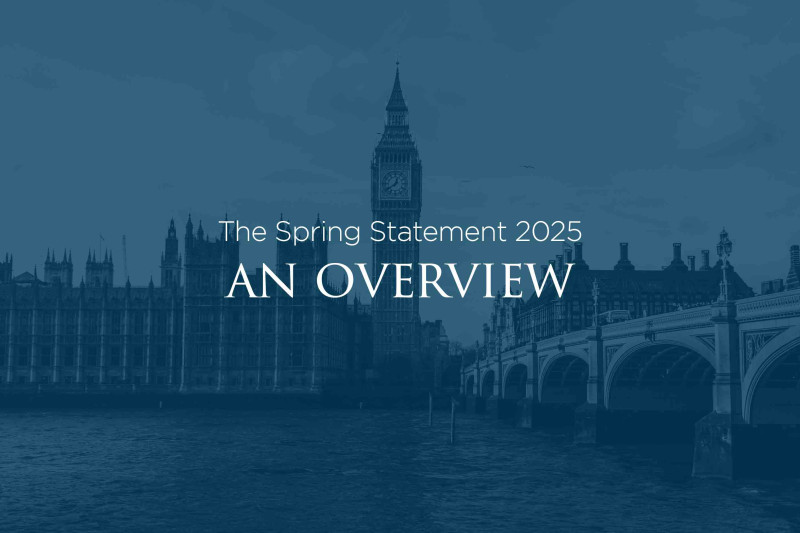Spring Statement 2025: A Round-Up

Foresight is something we all strive to have, both in the business world and personally. Yet, predicting the future is, of course, tricky and not an exact science.
Take me, for example. Five weeks ago, I watched my team, AFC Bournemouth, beat Southampton 3 - 1. I joined fellow fans in singing (non-stop for 30 minutes) “Is this the way to Barcelona, Bayern Munich, Lazio, Roma” to the tune of Tony Christie’s Amarillo, as we moved into 5th in the Premier League. I’m ignoring that Lazio were not in the Champions League this season, Roma have not been since 2019 – something Patrick Gibney in our Wills, Trust and Probate Team was quick to point out to me. If only I had had the foresight to see us now, on the back of three losses and a draw, sitting 10th, albeit only five points off 4th - so let a man dream.
Five months ago, Rachel Reeves delivered her first Budget and promising economic growth and wide-reaching investment in public services. Yet, the world has changed. Donald Trump and JD Vance have sent markets and European Leaders spinning, economic growth appears missing in action, and inflation remains stubbornly above the Bank of England’s 2% target. If only Rachel Reeves could have definitely foreseen all that was to come (not that most were not aware of Donald Trump’s fondness for tariffs and government by chaos).
There was not a huge amount of optimism ahead of the Chancellor’s statement this afternoon, but as many in her role have done before, she sought to paint as clear and uplifting a view as possible.
What we already knew ahead of the statement
- To be clear, the outlook could be better. Yields on 10-year gilts (the cost of government borrowing) has increased from 4% to 4.7% in the past year, meaning more funds are diverted to funding Government debt and away from investment, thus reducing the Chancellor’s headroom imposed by her fiscal rules.
- Tax and economic changes announced at the Budget are also due to come into effect shortly:
- The increase in the rate of Employer’s National Insurance will go into effect from 6 April, rising from 13.8% to 15%. A survey from the CIPD in February shows the uncertainty:
- nearly a third of firms plan on reducing staff numbers or cutting recruitment;
- just over 40% of firms plan to raise prices to offset the rise, which will undoubtedly make the fight against inflation a bit tougher; and
- around a quarter of firms plan to cancel or scale down their investment or expansion – a counterweight to the Chancellor’s growth aim.
- The National Living Wage also increases to £12.21 (for those 21 or older) from 1 April, which will bring some relief to workers, but will also further increase employer’s costs (and how much Employers’ National Insurance they must pay).
- For people day to day, Council Tax increases go into effect from 1 April.
- There also remains the risk from our friends across the pond, with Donald Trump threatening to impose tariffs on UK goods. This certainly adds further uncertainty, which may uproot the Chancellor’s spending plans, I leave it to you as to whether the USA is still our best friend and ally.
I was told last weekend by a young family member that I reminded her of Eeyore, the donkey from Winnie the Pooh. I am not sure that was the compliment she intended (she assures me it was), but I sure sound like him right now. You could be forgiven for thinking the economic outlook is rather negative. It would be disingenuous to suggest it is anything but uncertain. However, my job is to paint a balanced picture, so here goes.
What was actually in the statement itself
The Chancellor's Fiscal Rules
The chancellor re-committed to her self-imposed fiscal rules, in particular her requirement that day-to-day spending is met by tax receipts.
The Office for Budget Responsibility (“OBR”) has stated that had nothing been done, the budget would now be in deficit by £4.1bn by 2029/2030, which is not permitted by those fiscal rules. At the Budget, a surplus of £9.9bn had been expected. The Chancellor claims her steps today will restore this headroom, and move the budget into surplus by 2027/2028, and restore the surplus of £9.9bn by 2029/2030.
Inflation and Growth
- The 2025 growth forecast has been reduced, having been 2% at the Budget, this has been revised to 1% today. Sounds negative right, but here’s where I leave Eeyore behind (for a bit).
- The Chancellor re-emphasised the Government’s planning and infrastructure changes, the third runway at Heathrow, and changes to the pension system with the National Wealth Fund as drivers for growth. Whether this proves to be true remains to be seen, but the OBR may actually be somewhat convinced.
- In a sign of positivity, the OBR has revised up its growth forecast for the next four years, to 1.9% in 2026, 1.8% in 2027, 1.7% in 2028 and 1.8% in 2029. The economy is now also forecasted to be larger at the end of the five years currently forecasted when compared to the forecast at the Budget.
- Households are also expected to be £500 better off, with real household disposable income increasing this year, at a rate the Chancellor says is nearly double what was expected at the Budget and compared against the last Government’s final projections.
- The OBR has also stated that the Government’s planning reforms are due to boost GDP permanently by 0.2%, equating to £6.8bn extra being in the economy by 2029/2030, with a boost of 0.4% of GDP within 10 years, an additional £15.1bn in the economy.
- That all sounds rather positive, an uptick in the Chancellor’s fortunes. However, that is not to say there are not challenges. Inflation is expected to be 3.2% this year (well above the Bank of England’s target). However, it is then forecast to begin falling to 2.1% in 2026, and then 2% for 2027 onwards. The fact that the Bank of England’s target of 2% may not be hit until 2027 is unlikely to be welcome news to many, albeit may of course benefit savers around the country. However, we are a long way from the heady heights of 11% just a couple of years back.
Steps taken by the Chancellor
In an effort to cement the above, the Chancellor confirmed a number of plans for welfare changes, defence spending, housebuilding, and educational investment (albeit many had already been announced).
- The Chancellor confirmed there were no tax changes in the Spring Statement – no “Mini-Budget” to be seen here. However, she recommitted to clamping down on tax evasion, aiming to raise a further £1bn – as many a Chancellor has promised this, it remains to be seen if this actually occurs.
- On welfare, the Chancellor noted 1,000 people a day are qualifying for Personal Independence Payment, whilst 1 in 8 young people are not in employment, education or training. The OBR expects the Government’s recent changes, as were announced last week, to save £4.8bn. However, the Chancellor also confirmed £1bn for personalised employment support to get people back into work, and £400m to implement the changes. Therefore, the actual savings will actually amount to £3.4bn.
- Housebuilding, the OBR says, should reach a 40 year high, with 305,000 homes a year to be built by the end of the forecast, helping to build 1.3m homes over the next five years – this will be seen as good news for a Government promising 1.5m homes by the end of the parliament, and for Norfolk’s property industry. However, there does remain the challenge of the impending changes to Stamp Duty, something our residential property colleagues are all too aware of.
- Most of the Chancellor’s spending commitments were held until the Spending Review in June. However, the Chancellor confirmed:
- defence spending is to be increased to 2.5% of GDP by April 2027, with oversea aid being reduced to 0.3% of gross national income. The Chancellor confirmed an additional £2.2bn of investment for the Ministry of Defence in the next year, as an advanced down-payment on such a commitment.
- NHS England’s abolition will see money redirected to front-line health services.
- £600m has been allocated to train 60,000 more construction workers, and provide 10 new technical excellence colleges.
- The Government committed to reducing the cost of running government by 15%, with the Chancellor advancing £3.25bn of investment to implement efficiencies. This includes voluntary exit schemes to reduce the size of the civil service – some may be seeing similarities with the scheme offered by Elon Musk and Donald Trump in the USA. The Chancellor expects this to result in a further saving of £3.5bn of day-to-day savings by 2029/2030, with a total reduction of £6.1bn by that same date.
- Day to day spending will increase above inflation for the next five years, and that spending in day to day spending across government will be protected in the Spending Review, save for international development – I’m finding little positives in this list, even if they are not as frequent as we would like.
Conclusion
What is actually the upshot of all this? After all, unlike the Budget, not much new policy has been announced here! I started this article by talking about foresight, and how we wish we could all plot the future with precision like accuracy. The reality is that it is nearly impossible. The world looked quite different five months ago, I am sure it will do again come the next Budget.
Many of the measures businesses and individuals are facing now, and will do in the coming weeks, were announced months ago. However, the challenges around those measures continually change, and everyone is trying their best to make their way through a very uncertain and unpredictable world. That being said, we hear and read a lot of negativity in the media. I note I may have inadvertently contributed to it here. So here is something to buck the trend - the economic outlook on paper appears tricky, and it is but that does not mean that the drive of the people in this country has disappeared.
Since the end of the pandemic, I have seen day to day that the Norfolk community remains steadfast in moving forward and supporting each other. So long as that happens, we won’t go too far wrong. There are flowerings of optimism in the growth revisions and investments announced in the Spring Statement today, and notwithstanding the outlook, I and many of the contacts I speak to are sure that the drive of people wanting to grow their businesses, provide for their families, and chart ahead even in uncertain times, remains – that’s optimism right, perhaps not the optimism levels of say, Tigger, but optimism.
My AFC Bournemouth still have nine games to make me a foreseeing genius. Whether I spend my Autumn weeknights in Barcelona, at some previously unheard of team in the lower European competitions, or at home on my sofa (the most likely option) is really not that consequential. The day to day effects people feel are. I may not be able to predict football it seems, but what I can guarantee is that the team at Leathes Prior will continue to support our clients and the wider community, and to help you and your business in plotting the path ahead.
Nothing is ever certain, but having well-rounded, considered, and specific advice certainly helps, and that is what we will continue to offer. If you need any assistance in the coming weeks and months, please do reach out to our team via info@leathesprior.co.uk or call 01603 610911.


